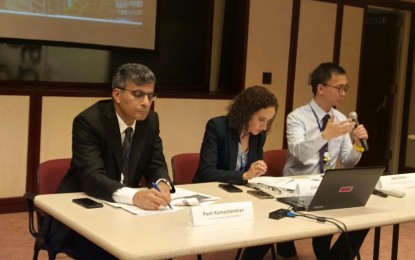
FASTER ECONOMIC GROWTH. Asian Development Bank officials, led by Philippines country director Pavit Ramachandran (left), hold a press briefing in Mandaluyong City on Thursday (April 11, 2024) for the Asian Development Outlook April 2024 report. Ramachandran said the Philippine economy would likely grow by 6 percent in 2024 and 6.2 percent in 2025. (PNA photo by Anna Leah Gonzales)
MANILA – The Philippines will continue to be among the fastest-growing economies in Southeast Asia this year and in 2025, Manila-based lender Asian Development Bank (ADB) said on Thursday.
In its Asian Development Outlook (ADO) April 2024 report, the ADB projected the Philippine economy to grow by 6 percent this year on the back of slowing inflation, stronger and broad-based domestic demand, and higher public investment.
The latest forecast is within the 6 percent to 7 percent economic growth target of the government.
For 2025, the ADB expects Philippine economic growth to accelerate to 6.2 percent.
"So overall, (the) Philippines is still very much top of the leaderboard here in the region. Growth has remained robust, driven by domestic demand consumption and investment. I think services sectors continue to be very resilient, driving growth to a large extent," ADB Philippines country director Pavit Ramachandran said in a briefing at the ADB headquarters in Mandaluyong City.
Ramachandran said the government's move to open up the economy to more foreign investment and trade through several measures has also helped drive growth.
"And these are really signaling that the Philippines is now very much open for business and these have sustained a positive outlook," he said.
According to Ramachandran, the Philippines’ growth momentum is picking up speed, driven by the government’s efforts to improve budget execution, mobilize additional revenue, and pursue reforms to boost the investment climate.
"Investments on large public infrastructure projects, as well as much-needed social services, will boost government expenditures and bode well for the economy in the long run,” he said.
ADB principal country specialist Cristina Lozano added that the ADB expects exports of goods and services to recover in the second half of the year.
"We expect a rebound in the second half of the 2024 as we see that the global cyclical downturn in electronics is coming to an end. And as we know, the Philippines is a country that is very well established in terms of being an exporter of electronic components so we're positive on that regard and also the services sector with the tourism, improving BPO services," she said.
The ADB, however, noted that the growth outlook is subject to some downside risks.
Severe weather events, such as a prolonged El Niño dry weather episode and possible strong typhoons later in the year due to the La Niña phenomenon, could result in inflation pressures.
A sharper slowdown in major advanced economies, heightened geopolitical tensions, and higher-than-expected global commodity prices could also weigh on growth.
The ADB, however, expects the country's inflation to remain within the government's 2 percent to 4 percent for 2024 and 2025.
The inflation forecast for 2024 was reduced to 3.8 percent from the earlier 4 percent, while the projection for 2025 is at 3.4 percent.
The ADB report noted that decelerating global oil prices and an extension in reduced tariffs on major food items, including rice, corn, and pork until Dec. 2024 would help contain food inflation.
The report, meanwhile, highlighted that promoting higher levels of private sector participation in the economy would be vital to further raise growth and productivity.
The ADB said an enhanced public-private partnership regulatory framework with the signing of the Implementing Rules and Regulations of the PPP Code of the Philippines would help further mobilize private investment for infrastructure development, including for green and resilient energy and telecommunications. (PNA)
